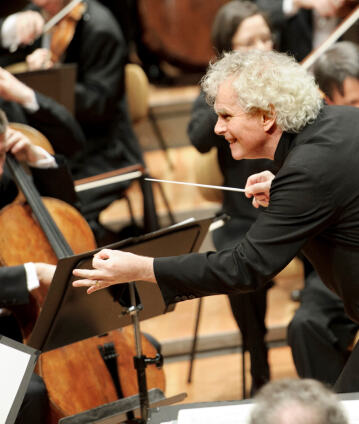Simon Rattle conducts Brahms, Debussy and Haas

Anyone who thinks of Impressionism in music thinks of Claude Debussy’s multi-coloured, shimmering tone poem La Mer. In this concert from February 2014, Sir Simon Rattle contrasts this with Johannes Brahms’s Third Symphony whose many beauties include the theme of the Allegretto, possibly the most yearning melody of all time. This concert also includes the world premiere of a new work by Georg Friedrich Haas.
The absence of tone painting touches in the orchestral triptych La Mer irritated his contemporaries. However, Claude Debussy was not at all interested in depicting the sea in sound: “La Mer”, Paul Dukas wrote, “is the face of the anonymous elements, the inhuman meteors. […] It’s no longer a dialogue between nature and humanity as in Liszt; there is only dialogue between wind and water, a dialogue of the ocean that excludes anything anthropomorphic, any relationship to a subject.”
Sir Simon Rattle places Debussy’s multi-coloured orchestral work next to Johannes Brahms’s Third Symphony in this concert. Though it is well-known that Brahms excluded natural subjects in his symphonic writing, in the case of his Third Symphony, written in the pastoral key of F major, Clara Schumann associated the “mysterious magic of life in the forest”, the “resplendence of the awakened day” and the “trickling of streamlets, the playing of beetles and mosquitoes” when she heard the piece.
The central work of the programme, nonetheless, is the world premiere of a new piece, dark dreams, which Georg Friedrich Haas composed in New York in 2013 and, like so much of what he writes, contains microtonal elements – intervals smaller than the semitone of the normal system. According to Haas, the working title does not incidentally refer to concrete (bad) dreams, but is “a kind of guide to the direction in which I suggest it is listened to”. For him, it is important that the listener “surrender to the maelstrom of sounds and emotions, and that these sounds and emotions communicate directly without the need for long explanations.”
© 2014 Berlin Phil Media GmbH
Related interviews
Artists
Our recommendations
- Murray Perahia and Simon Rattle with Schumann’s Piano Concerto
- Simon Rattle conducts Schumann, Wagner, Ravel, Debussy and Ligeti
- Simon Rattle conducts “Weltethos” by Jonathan Harvey and Hans Küng
- Europakonzert from Prague with Sir Simon Rattle and Magdalena Kožená
- First concert in the Brahms/Schumann cycle with Simon Rattle
- Simon Rattle conducts Rhapsodies at the Waldbühne